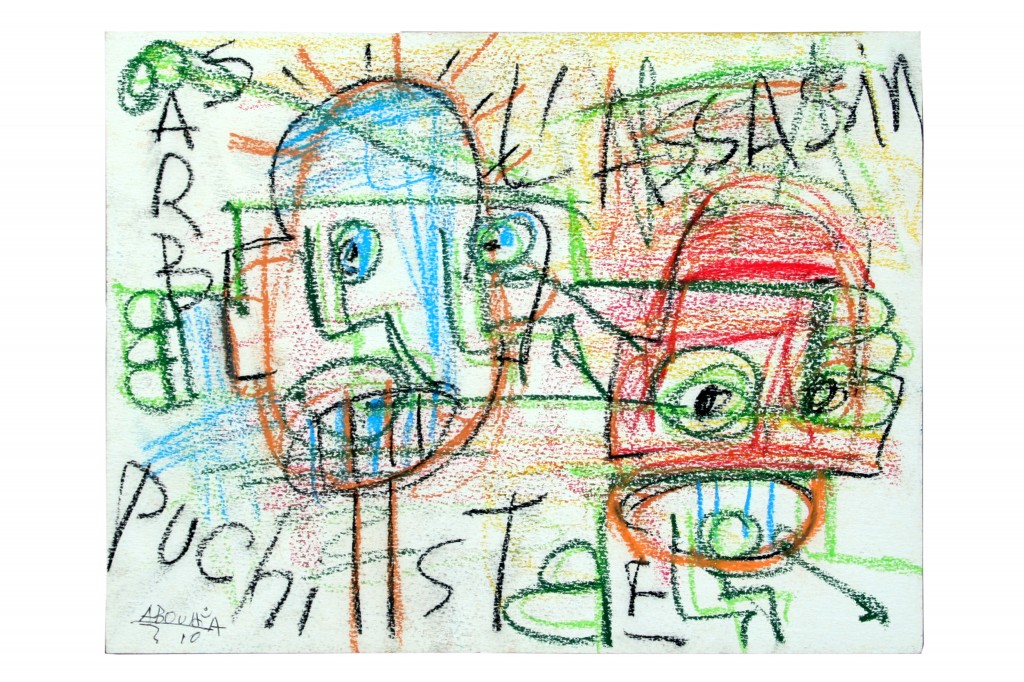This post is part of our special coverage Côte d'Ivoire Unrest 2011.
In the aftermath of a turbulent week in which the Cote d'Ivoire was plunged into new bouts of unprecendented violence since the presidential elections in late 2010, the United Nations has warned as to the risk of civil war.

Drawing by 26 year-old Ivorian artist Aboudia (Abdoulaye Diarrassouba), December 2010. Photo by Stefan Meisel, copyright Demotix (20/12/2010).
The violence surrounding the political stand off between the country's two leaders, Laurent Gbagbo and Alassane Ouattara – who each claim to have won the 2010 presidential election – is worsening.
A few Ivorian citizens have been calling for restraint on the Internet, although they are a minority. Unlike the majority of Twitter users in the country who have been fanning the flames of division on both sides, blogger Yeni Djidji describes the most recent violence in her blog [fr] as, “Equally ridiculous”.
In the post, Djidji deplores the destruction of buses in the former capital city of Abidjan belonging to SOTRA (Abidjanais Transport Society) by supporters of Ouattara, and condemns the reactions of the pro-Gbagbo groups who subsequently destroyed the private communal mini cars allegedly used for transport by Ouattara’s supporters.
Vous voyez à quel point la situation devient ridicule. A quel point le fanatisme politique, peut inhiber le bon sens des gens. On sait tous où Alassane se trouve, on sait tous où Gbagbo est. Mais, c'est dans les quartiers que les gens s'empoignent, ce sont les biens qui n'appartiennent ni à l'un ni à l'autre qu'ils détruisent.
In his blog Dans ma cabeza, Stephane questions the profound motivations of those who pose these acts of violence. In his post ‘Au nom de … quoi?’ (‘In the name of…what?’) [fr], he recalls the painful events the Cote d'Ivoire has experienced in the past:
Quel souvenir gardons-nous des évènements de 2000 ?
? Une des nombreuses expressions de notre vocabulaire politique : le balayeur balayé ?
? Un « beau » monument censé célébrer les combattants de la démocratie, mais qui ne représente pas encore le symbole qu’il doit être ?
Si vous êtes conscients de l’importance de cette période dans notre histoire mais comme moi, êtes incapables d’avoir un souvenir très précis, alors dites-moi au nom de quoi nous battons-nous aujourd’hui ?
? One of the numerous expressions in our political vocabulary: the road sweeper is being swept?
? A “beautiful” monument intended to celebrate the fight for democracy, but which does not yet represent that which it is supposed to symbolise?
If you are conscious of the importance of this period in our history but like me, are incapable of having a precise memory then tell me, in the name of what are we fighting today?
Stephane then challenges the ideas, in the name of which, Ivoirians are engaging in this excessive violence:
Au nom de… quoi ?
Au nom de la souveraineté ??? Clamée par l’un dont certains choix économiques pour son pays trahissent les mots ?
Au nom de… quoi ?
Au nom de la démocratie ??? Défendue par l’autre dont les supputations sur le passé jettent des ombres sur sa cause ?
Souveraineté ??? Démocratie ??? Au regard de tout ce sang versé, ce ne sont que d'autres noms qu’ils donnent au mal selon qu’il vive dans un hôtel ou dans un palais.
In the name of sovereignty??? Claimed by one whose economic choices for his country betray his words?
In the name of… what?
In the name of democracy??? Defended by another for whom the speculations of the past throw shadows on his cause?
Sovereignty??? Democracy??? With regards to all this spilt blood, they are nothing other than meaningless words they give for evil, whether living in a hotel [President Ouattara is currently entrenched in an Abidjan hotel] or in a palace [President Gbagbo still occupies the presidential palace].
On Twitter, some Ivorian netizens have asked the same questions, as @diabymohamed, retweeted by @Jeanjacquesk:
@jeanjacquesk RT @diabymohamed #civ2010 on sème ce qu'on récolte. Pourquoi avons nous abandonné notre culture de paix ? POURQUOI ET POUR QUI???
In the same vein, blogger Edith Brou suggests that Ouattara and Gbagbo should be banished from Ivorian politics in order to see a return to peace:
@edithbrou on bannit LG et AO de toute implication (et leur clique) dans la vie politique ivoirienne.
Alongside these calls for restraint on the Internet, Ivorian women have decided to make themselves heard. At Treichville (an Abidjan commune), they marched dressed in white [fr] on February 25, 2011, to denounce the killings of their children.
They met at the Headquarters of the PDCI (Democratic Party of Ivory Coast) and from there made to march on the Republican Guard barracks. A police operation blocked the women’s march and intervention by a police superintendant put an end to it.
Update: on March 3, 2011, six or seven women were shot dead by the security forces loyal to Gbagbo and up to 100 civilians were wounded during a march in support of President Ouattara in Abobo, a district of Abidjan.
This post is part of our special coverage Côte d'Ivoire Unrest 2011.







6 comments